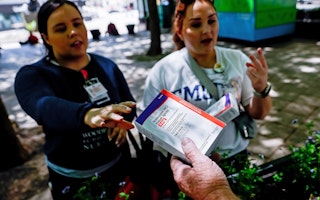The Tragedy of Failed Drug Policies in Brazil
By Ricardo André Souza & Rodrigo Baptista Pacheco
The current drug policy supported by the United Nations Organizations espouses that a world without drugs is possible. In pursuit of this goal, resources are spent on financing a blatantly warlike approach reflected in the term "war on drugs." As if it were even possible to wage war on drugs; as if it were not a war fought against people.
In Brazil, and more specifically in Rio de Janeiro, this approach has translated into a “criminal policy of bloodshed,” in the words of Nilo Batista. A social tragedy that affects everybody: addicts, users, small drug dealers and the general population. We all suffer under this warlike policy adopted many years ago.
The implementation of Law 11343 has been a negative development. Its apparent policy of easing repression of the drug trade has actually resulted in a significant increase in the prison population, and especially in the number of people arrested for drug dealing.
In reality, law enforcement promoted many users to the status of drug dealers. At the same time, small drug dealers who conduct this illicit activity to support their own use or to earn a little extra money and who make up the bulk of the cases, as revealed in a study by Luciana Boiteux, were relegated to the status of enemy of the state.
The progressive proposition to allow small dealers, if arrested and convicted, to provide community service in lieu of a short jail sentence encounters many obstacles that prevent it from being effectively applied by the criminal justice system.
This situation of extreme inequality is further aggravated by the fact that 42% of the municipalities in Brazil do not provide a Public Defender's Office, leaving many young people, most of them black and poor, deprived of their right to an adequate and efficient defense. This means that a young person who is already discriminated against by law enforcement for being considered a drug dealer will rarely find a way out of this situation without proper legal assistance.
In recognition of the failure of the current drug policies, the National Association of Public Defenders (Anadep) has launched the Bank of Injustices, in partnership with the Brazilian Committee on Drugs and Democracy (CBDD) and with support from Viva Rio. The Bank’s goal is provide a human face to the injustices that are being committed by enforcing drug laws, and to provide a platform for presenting cases of users or addicts wrongfully treated as drug dealers.
The war on drugs has already been lost and the negative social outcomes are hard to overlook. The question remains as to what interests serve the maintenance of a repressive policy that has only resulted in increased violence, which over the course of 40 years has been completely incapable of reducing the consumption of drugs in the world. We must find an alternative to this war by developing policy connected to public health and disassociated from the stigmatizing repressive-criminal structure.
It is time that we give some serious and unbiased consideration to alternatives that have never been tried in Brazil before, such as decriminalization, responsible regulation and, perhaps, the legalization of selected illegal drugs. Between the extremes, the failure of criminalization to one side, and completely irresponsible "liberalization" on the other, there are various frameworks that have been successfully implemented by other countries. One such an example is the experience of Portugal, where decriminalization ten years ago has resulted in a reduction of drug use among young people.
Our only response so far to the complexity of the drug problem had been an insistence in simple stances such as “we are not prepared”" or “drug use will increase.” Portugal's successful experience contradicts this paralysis. We have to try it. And why not?
Ricardo André Souza is a public defender from the state of Rio de Janeiro.
Rodrigo Baptista Pacheco is a public defender from the state of Rio de Janeiro.


